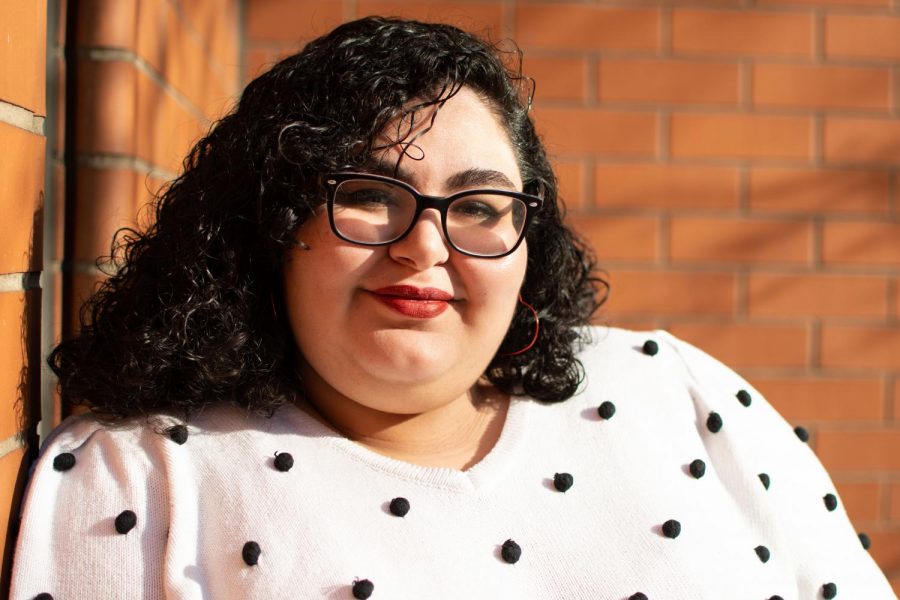The establishment of a feminist club at her high school influenced Liberal Studies sophomore Victoria Abraham to create her Instagram page, @fat_fab_feminist. The then-junior sought to be heard in the small city of Boca Raton, Florida, despite the constant attempts from her peers to silence her. Now, she has over 26,000 followers, and the whole nation is hearing her.
As a feminist and “fat activist,” Abraham uses her social media platform to communicate her message about fat stigma. This message includes the social acceptance of a fat body type as well as the liberation of “fat” as a derogatory term. She also announces current events and shares her experiences as a fat woman.
At first society’s standards impeded her confidence. But then, she discovered a massive body-positive community on social media, and everything changed.
“When I first started my page, it was an escape for me and from the insufferable repetition of what it is like to live in Florida,’’ Abraham told WSN. “I was able to surround myself with people that I wish I could be surrounded by in real life.’’
Through social media, Abraham was able to connect with users who shared and acknowledged her beliefs. Not only did this spark her confidence to express her opinions, but it also brought a wave of self-love that continues to grow.
“The longer I have this page, the more confident that I get in myself,’’ Abraham said. “Not because of followers or anything, but because of people I follow — my feed is full of fat people. Seeing people who experience what I experience, and who look like me, and I can see myself in them — that is the biggest impact for me.’’
According to Abraham, many are ignorant of fatphobia as a concept; this is why it is her goal is to educate her followers about the importance of fat liberation.
“If people do not have somebody who can help them understand what is going on, I try to give them a new perspective,’’ she said. “I know that for some of my friends, they did not get what fatphobia was, or any of that stuff, until I started to talk about it.’’
One of the various issues that cultivate systemic fatphobia is the fear and abuse of using the term “fat” to categorize bodies. Abraham finds that we need to halt the stigmatization of the term in order to normalize its use. This abuse is often seen on her page.
Although she does not read the comments on her page, Abraham is aware of how often people use the term “fat” to ridicule her. This is why she believes in the importance of using the word to describe herself objectively.
“If I use that as a neutral term to describe my body, then when people use it, or try to use it as a way to offend me or hurt me, it means nothing,’’ she said. “I am taking away that power, and no power remains in that term.’’
Many of Abraham’s posts consist of political memes and images of herself, captioned with stories of her experiences as a mixed-race fat woman. With these posts, she strives to make her message of body-positivity and fat acceptance clear.
“You have seen ‘Pitch Perfect’; [the character] Fat Amy calls herself fat and she puts it out there,” said Abraham. “I think that is like the same thing with me. I am fat, I am visibly fat. There is no way that you can look at me and say, ‘Oh, you’re not fat’. I am. I know that I am. I live with my body every day and know what I look like. I am not, under any illusions, saying that is not what I am.’’
Although the body positive movement claims to fight for all body types, Abraham believes that there is a flaw in its crusade. As the movement became more mainstream, she saw a decline in fat acceptance from body activists.
“I am body positive, and I think that it is important, but that is not where it should end,’’ she said. ‘’If you are an advocate for body positivity, you also have to be an advocate for fat liberation. You have to give voices for fat people, because they are not experiencing the same things as you are.’’
Being a fat activist is a label Abraham proudly identifies with. However, she is not fond of categorizing herself as an influencer, since she believes that the term contradicts her views. Regardless, Abraham is aware that people pay attention to her opinions no matter how she sees her status on social media.
“I just hope that maybe my page makes people question ideas they do agree with, and question their beliefs, and understand why they think the way they do,’’ she said. “I just think it is important that people should see another perspective that they do not see every day.”
Regarding the future of her page, Abraham hopes to continue expressing her beliefs on fatphobia and sharing her experiences for her audience to better understand the topic.
“I do not know if I have a real message or anything,’’ she said. “My entire goal in life is to leave the world better than I found it. After all, I am just a normal person who happens to have a large platform to talk about the things I care about.’’
A version of this article appears in the Tuesday, Feb. 18, 2020, print edition. Email Madison San Miguel at [email protected].


























































































































































